
Hãy nhập câu hỏi của bạn vào đây, nếu là tài khoản VIP, bạn sẽ được ưu tiên trả lời.


Đặt \(a=\dfrac{1}{x};b=\dfrac{1}{y};c=\dfrac{1}{z}\Rightarrow xyz=1\) và \(x;y;z>0\)
Gọi biểu thức cần tìm GTNN là P, ta có:
\(P=\dfrac{1}{\dfrac{1}{x^3}\left(\dfrac{1}{y}+\dfrac{1}{z}\right)}+\dfrac{1}{\dfrac{1}{y^3}\left(\dfrac{1}{z}+\dfrac{1}{x}\right)}+\dfrac{1}{\dfrac{1}{z^3}\left(\dfrac{1}{x}+\dfrac{1}{y}\right)}\)
\(=\dfrac{x^3yz}{y+z}+\dfrac{y^3zx}{z+x}+\dfrac{z^3xy}{x+y}=\dfrac{x^2}{y+z}+\dfrac{y^2}{z+x}+\dfrac{z^2}{x+y}\)
\(P\ge\dfrac{\left(x+y+z\right)^2}{y+z+z+x+x+y}=\dfrac{x+y+z}{2}\ge\dfrac{3\sqrt[3]{xyz}}{2}=\dfrac{3}{2}\)
\(P_{min}=\dfrac{3}{2}\) khi \(x=y=z=1\) hay \(a=b=c=1\)

\({x^2} = {4^2} + {2^2} = 20 \Rightarrow x = 2\sqrt 5 \)
\({y^2} = {5^2} - {4^2} = 9 \Leftrightarrow y = 3\)
\({z^2} = {\left( {\sqrt 5 } \right)^2} + {\left( {2\sqrt 5 } \right)^2} = 25 \Rightarrow z = 5\)
\({t^2} = {1^2} + {2^2} = 5 \Rightarrow t = \sqrt 5 \)

a.
\(A=\left(\dfrac{\left(x-1\right)\left(x^2+x+1\right)}{x\left(x-1\right)}+\dfrac{\left(x-2\right)\left(x+2\right)}{x\left(x-2\right)}+\dfrac{x-2}{x}\right):\dfrac{x+1}{x}\)
\(=\left(\dfrac{x^2+x+1}{x}+\dfrac{x+2}{x}+\dfrac{x-2}{x}\right):\dfrac{x+1}{x}\)
\(=\left(\dfrac{x^2+3x+1}{x}\right).\dfrac{x}{x+1}\)
\(=\dfrac{x^2+3x+1}{x+1}\)
2.
\(x^3-4x^3+3x=0\Leftrightarrow x\left(x^2-4x+3\right)=0\)
\(\Leftrightarrow x\left(x-1\right)\left(x-3\right)=0\)
\(\Rightarrow\left[{}\begin{matrix}x=0\left(loại\right)\\x=1\left(loại\right)\\x=3\end{matrix}\right.\)
Với \(x=3\Rightarrow A=\dfrac{3^2+3.3+1}{3+1}=\dfrac{19}{4}\)



Bài 4:
a. Vì $\triangle ABC\sim \triangle A'B'C'$ nên:
$\frac{AB}{A'B'}=\frac{BC}{B'C'}=\frac{AC}{A'C'}(1)$ và $\widehat{ABC}=\widehat{A'B'C'}$
$\frac{DB}{DC}=\frac{D'B'}{D'C}$
$\Rightarrow \frac{BD}{BC}=\frac{D'B'}{B'C'}$
$\Rightarrow \frac{BD}{B'D'}=\frac{BC}{B'C'}(2)$
Từ $(1); (2)\Rightarrow \frac{BD}{B'D'}=\frac{BC}{B'C'}=\frac{AB}{A'B'}$
Xét tam giác $ABD$ và $A'B'D'$ có:
$\widehat{ABD}=\widehat{ABC}=\widehat{A'B'C'}=\widehat{A'B'D'}$
$\frac{AB}{A'B'}=\frac{BD}{B'D'}$
$\Rightarrow \triangle ABD\sim \triangle A'B'D'$ (c.g.c)
b.
Từ tam giác đồng dạng phần a và (1) suy ra:
$\frac{AD}{A'D'}=\frac{AB}{A'B'}=\frac{BC}{B'C'}$
$\Rightarrow AD.B'C'=BC.A'D'$

Những tam giác đồng dạng là
- Tam giác ABC đồng dạng với tam giác EDF với tỉ số đồng dạng là 1
- Tam giác MPN đồng dạng với tam giác ABC với tỉ số đồng dạng là \(\frac{1}{2}\)
- Tam giác MPN đồng dạng với tam giác EDF với tỉ số đồng dạng là \(\frac{1}{2}\)
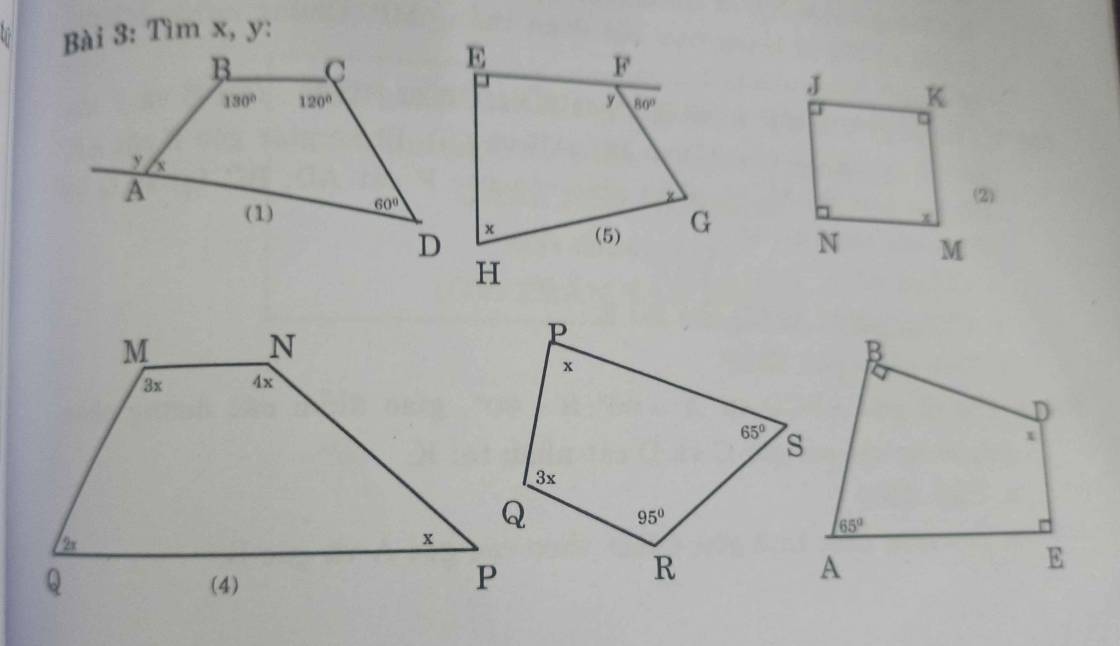
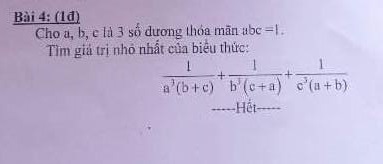
.png)

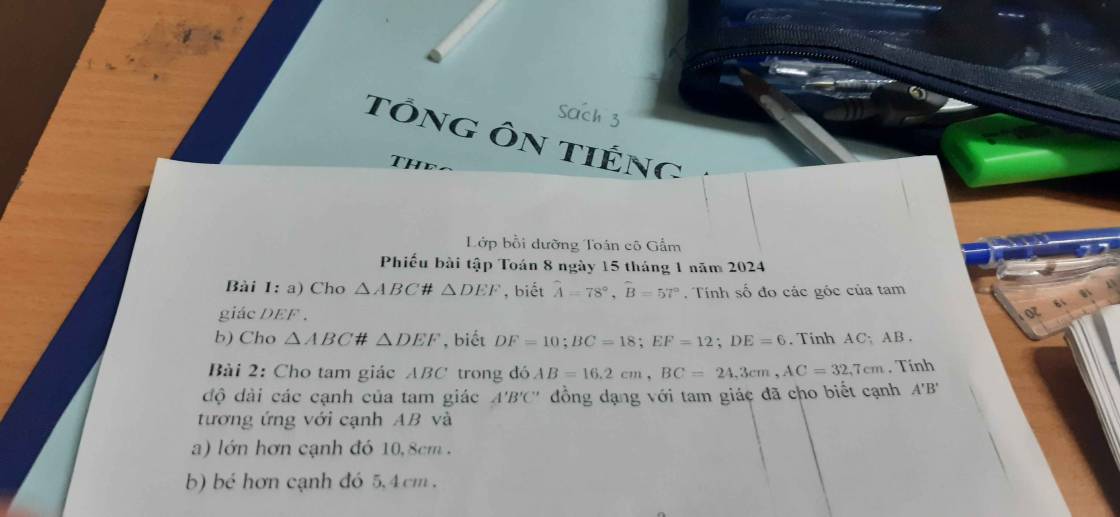
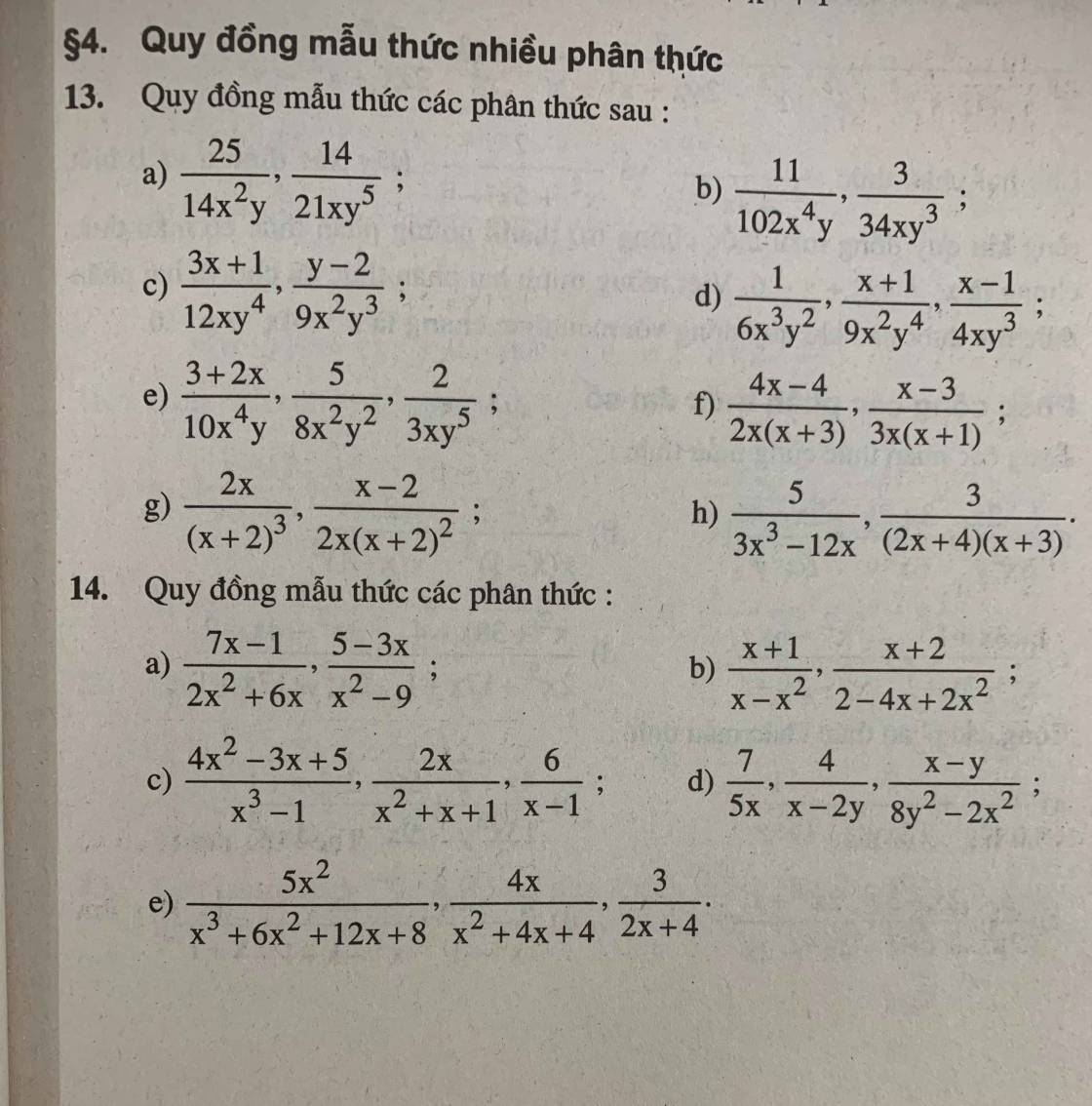


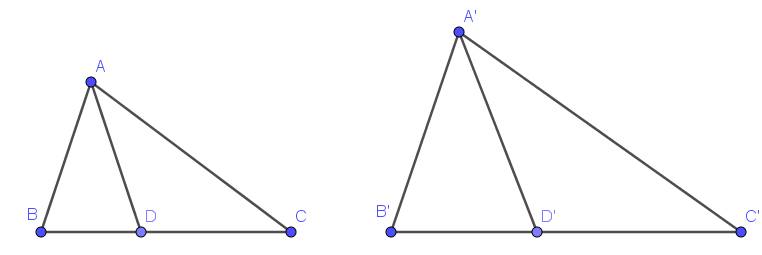
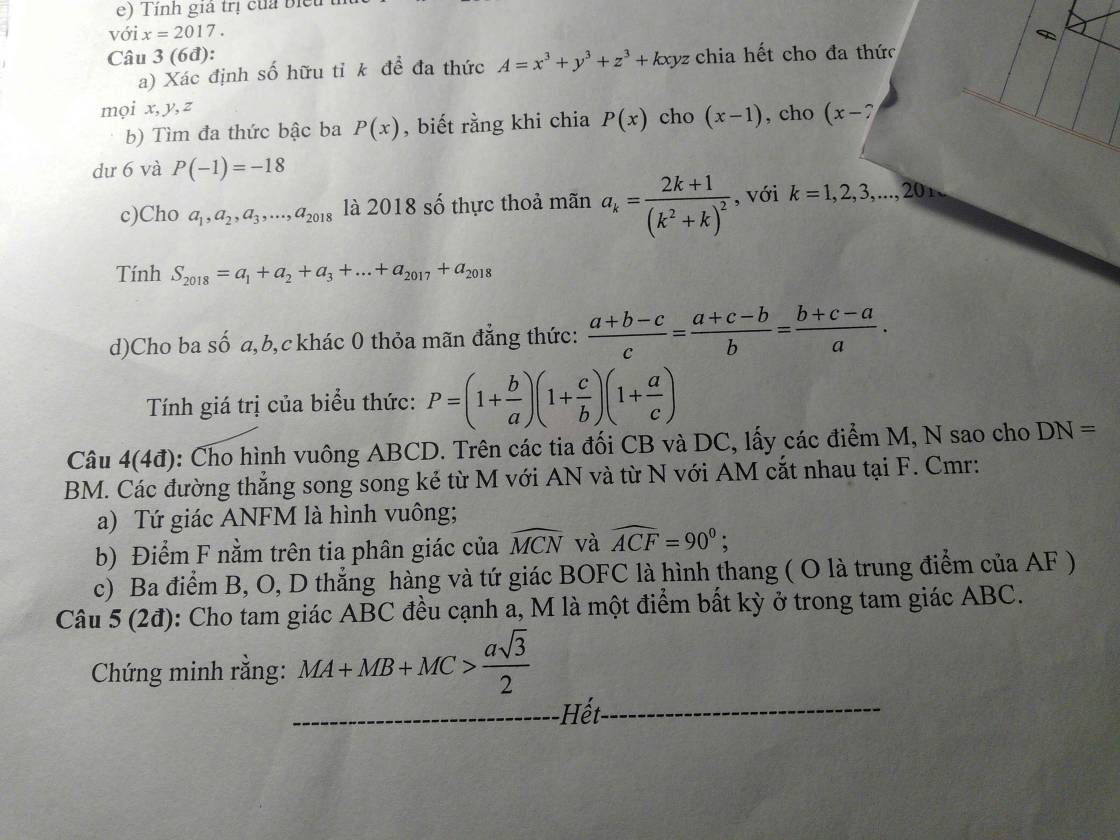

`# \text {Ryo}`
`3,`
Xét tứ giác ABCD:
\(\widehat{\text{A}}+\widehat{\text{B}}+\widehat{\text{C}}+\widehat{\text{D}}=360^0\left(\text{định lý tổng các góc của tứ giác}\right)\\ \Rightarrow\widehat{x}+130^0+120^0+60^0=360^0\\ \Rightarrow\widehat{x}=50^0\)
Ta có:
`x + y = 180^0 (\text {kề bù})`
`=> 50^0 + y = 180^0`
`=> y = 130^0`
Vậy, `x = 50^0; y = 130^0`
Xét tứ giác MNJK:
\(\widehat{\text{M}}+\widehat{\text{N}}+\widehat{\text{J}}+\widehat{\text{K}}=360^0\\\Rightarrow \widehat{x}+90^0+90^0+90^0=360^0\\ \Rightarrow\widehat{x}=90^0\)
Vậy, `x = 90^0`
Xét tứ giác PQRS:
\(\widehat{\text{P}}+\widehat{\text{Q}}+\widehat{\text{R}}+\widehat{\text{S}}=360^0\\ \Rightarrow\widehat{\text{P}}+\widehat{\text{Q}}+95^0+65^0=360^0\\ \Rightarrow\widehat{\text{P}}+\widehat{\text{Q}}=200^0\)
Ta có:
\(\widehat{\text{P}}+\widehat{\text{Q}}=200^0\\ \Rightarrow x+3x=200^0\\ \Rightarrow4x=200^0\\ \Rightarrow x=50^0\)
Vì \(\widehat{\text{Q}}\) `= 3*x`
`=>`\(\widehat{\text{Q}}=3\cdot50^0=150^0\)
Vậy, `x = 50^0; 3x = 150^0`
Xét tứ giác MNPQ:
\(\widehat{\text{M}}+\widehat{\text{N}}+\widehat{\text{P}}+\widehat{\text{Q}}=360^0\\ \Rightarrow3x+4x+x+2x=360^0\\ \Rightarrow\left(3+4+1+2\right)x=360^0\\ \Rightarrow 10x=360^0\\ \Rightarrow x=36^0\)
Ta có:
\(\widehat{\text{M}}=3\cdot x\\ \widehat{\text{N}}=4\cdot x\\ \widehat{\text{Q}}=2\cdot x\)
\(\Rightarrow\widehat{\text{M}}=3\cdot36=108^0\\ \widehat{\text{N}}=4\cdot36=144^0\\ \widehat{\text{Q}}=2\cdot36=72^0\)
Vậy, `x = 36^0; 2x = 72^0; 3x = 108^0; 4x = 144^0.`
Ta có:
\(\widehat{\text{F}_2}+\widehat{\text{ EFG}}=180^0\left(\text{kề bù}\right)\\ \Rightarrow80^0+y=180^0\\ \Rightarrow y=100^0\)
Xét tứ giác EFGH:
\(\widehat{\text{E}}+\widehat{\text{F}}+\widehat{\text{G}}+\widehat{\text{H}}=360^0\\ \Rightarrow90^0+100^0+\text{ }\widehat{\text{G}}+\widehat{\text{H}}=360^0\\ \Rightarrow\widehat{\text{G}}+\widehat{\text{H}}=170^0\)
Ta có:
\(\widehat{\text{G}}+\widehat{\text{H}}=170^0\\ \Rightarrow x+x=170^0\\ \Rightarrow 2x=170^0\\ \Rightarrow x=85^0\)
Vậy, `x = 85^0; y = 100^0.`
Xét tứ giác ABDE:
\(\widehat{\text{A}}+\widehat{\text{B}}+\widehat{\text{D}}+\widehat{\text{E}}=360^0\\ \Rightarrow65^0+90^0+x+90^0=360^0\\ \Rightarrow x=115^0\)
Vậy, `x = 115^0.`
(1) \(x=360^o-60^o-130^o-120^o=50^o\)
\(y=180^o-50^o=130^o\)
(2) \(x=360^o-3\cdot90^o=90^o\)
(3) \(\widehat{Q}+\widehat{R}+\widehat{S}=65^o+95^o+3x=160^o+3x\)
\(x=360^o-160^o-3x\Leftrightarrow4x=200^o\Leftrightarrow x=50^o\)
(4) \(\widehat{M}+\widehat{N}+\widehat{Q}+\widehat{P}=360^o\)
\(\Rightarrow3x+4x+2x+x=360^o\)
\(\Leftrightarrow10x=360^o\)
\(\Leftrightarrow x=36^o\)
(5) \(y=180^o-80^o=100^o\)
\(\Rightarrow x+x=360^o-90^o-100^o\)
\(\Leftrightarrow2x=170^o\)
\(\Leftrightarrow x=85^o\)
(6) \(x=360^o-2\cdot90^o-65^o=115^o\)